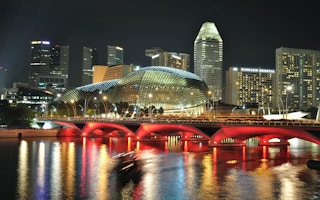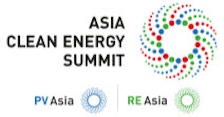In Asia Pacific, one in seven people still live without electricity. With this urgent need to provide energy access to millions of people – coupled with rapid economic and population growth – the region’s energy demand is set to soar.
The Asian Development Bank (ADB) adds that by 2035, Asia could consume more than half of global energy produced - up from 34 per cent in 2010.
Even as the region’s governments scramble to meet this rising energy demand, increasing carbon emissions from the production of mainly fossil-fuel derived energy are exacerbating climate change impacts in the region, with extreme weather events such as typhoons, floods, and droughts growing more intense and frequent.
These trends put governments in an unenviable trilemma – they must provide enough energy for all, make sure it is affordable, but curb the rise in emissions. Sustainable energy solutions such as energy efficiency and renewable energy, according to the United Nations, are the key to all these challenges.
In Asia, which has seen a fifteen-fold increase in clean energy investment in the past decade, one organisation that has industriously worked to drive knowledge development and create business opportunities for companies in this sector is the Sustainable Energy Association of Singapore (SEAS).
Founded in 2006, the Singapore-based non-profit industry association has worked with the private and public sectors to build technical know-how and create new business opportunities for sustainable energy adoption in Singapore and the region.
Kavita Gandhi, SEAS’s founding executive director, tells Eco-Business in a recent interview that the association’s launch was aligned with “the start of Singapore’s journey towards clean energy and sustainability”.
The industry body, which will mark 10 years next year, “is the pioneer sustainable energy association in Asia”. Gandhi recalls that Singapore’s clean energy sector was still a fledgling one in the early 2000s, and the few companies venturing into renewables at the time were “lone rangers”.
Singapore’s decision in 2006 to accede to the Kyoto Protocol – an international treaty to reduce greenhouse gas emissions – underscored the need for Singapore to shift towards a more efficient and low-carbon energy system, and provided the impetus for these cleantech and carbon companies to come together on a common platform.
Holistic take on sustainability energy
Once SEAS was formed with an initial membership of 35 companies, it took the conversation beyond simple efficiency, and adopted a more holistic approach to sustainable energy, shares Gandhi.
“We connected the dots between energy and climate change, looked at raising awareness among companies, and assisting the growth of the sector into an industry.”
With a grant from SPRING Singapore – a government agency supporting small and medium enterprises – SEAS set up a training centre to offer courses on topics ranging from renewable technologies, energy management, and even financing projects.
This helped to plug the knowledge gaps in Singapore’s energy sector, and also secured a stable revenue stream for the young association. By training representatives from various clean-tech companies in the city-state, SEAS also raised its profile among local industry players.
Over the last nine years, SEAS has now grown into a 10-staff outfit which has hosted about 200 programmes and trained about 7,000 professionals in Singapore.
Its journey since 2006 has closely mirrored the growth of Asia’s sustainable energy landscape.
Across the region, governments have pledged to back energy efficiency and renewable energy projects, with banks such as Asian Development Bank (ADB) lending billions of dollars a year to build clean energy projects.
In Singapore, too, renewables have flourished. The total size of grid-connected solar systems has soared 100-fold from 0.4 megawatts peak in 2008 to almost 40 MWp in the middle of this year.
“
We connected the dots between energy and climate change, looked at raising awareness among companies, and assisting the growth of the sector into an industry.
Kavita Gandhi, executive director, Sustainable Energy Association of Singapore
The government has further plans to aggregate 350 MWp of solar demand across public sector buildings by 2020.
The city-state has also pledged to reduce its emissions intensity - the emissions required to produce a dollar of gross domestic product - by 36 per cent from 2005 levels by 2030, a commitment that hinges heavily on improvements in energy efficiency.
Reducing emissions from transport and scaling up renewables are also necessary to meet these goals, says the government.
These developments have created a bigger market demand for sustainable energy solutions and a dynamic industry where new innovations are constantly emerging. SEAS strives to help its member companies make the best of these opportunities, says Gandhi.
SEAS sees itself as a bridge between the private and public sector. It hosts conversations between its member companies and the government on industry-related issues such as measures that may increase costs for cleantech companies. To potentially onerous policies, the association offers a fact-based, rigorously researched set of alternatives put together by the companies as a group, she explains
SEAS, whose membership has grown from an initial group of 35 firms to 210 companies today, also runs a business accelerator programme for local and international cleantech outfits and organises trade missions to create new opportunities for international and local firms alike.
Momentous milestone
The group reached a milestone when in March this year, it launched the Sustainable Energy Centre of Excellence (SECOE), a joint initiative with the Asian Development Bank.
It is a special achievement for SEAS because it was the first time ADB has ever inked an agreement with an industry association. “It was a proud moment for us to see their confidence in our ability to deliver training to regional officials,” says Gandhi.
The centre conducts seminars, workshops and sharing sessions for up to 150 policymakers a year from ADB’s 46 member countries. It is funded by ADB and International Enterprise Singapore, an agency which helps Singapore companies expand internationally.
In July this year, SEAS hosted its first batch of 50 government leaders from 14 countries to discuss energy efficiency roadmaps.
The next training session will be held in October alongside one of SEAS’s newest and most high-profile event, the Asia Clean Energy Summit (ACES).
The inaugural ACES conference, staged last October, took the organisation to a new level in bringing together players in the clean technology industry to work on projects across the region.
More than 800 participants from 21 countries attended the event, with overseas delegates coming from as far as Germany, Switzerland, Belgium, and New Zealand.
The summit’s highlight, the Clean Energy Leaders Dialogue (CELD), saw top leaders from the regional solar and renewables space share their thoughts on the latest developments in the industry.
ACES is now in its second year, and this year’s CELD will feature speakers such as Bloomberg New Energy Finance’s regional research head Justin Wu and clean energy powerhouse DNV GL’s chief executive, David Walker, among others.
Two dedicated conference tracks on Photovoltaics (PV Asia) and wider Renewable Energy (RE Asia) trends will take the discussion deeper : The PV Asia track will host sessions which focus on growing solar adoption and market opportunities in Singapore, and discussions on solar financing and investment.
The RE Asia conference track will bring together stakeholders from the public, private, and academic sector to discuss opportunities in areas like electric mobility smart grids and tidal energy, among others.
“Our key objective for ACES is to make it a platform for in-depth discussions on sustainable energy issues, and an opportunity for our members to showcase their good work,” says Gandhi. The fact that ACES attracted 15 sponsors in its first year is a sign of the organisation’s credibility and thought leadership, she adds.
Among the new sponsors this year are local solar firm Sunseap, who will be a lead sponsor at ACES for two years.
This year’s summit, which will be held at the Sands Expo and Convention Centre, Marina Bay Sands from 27 to 28 October as part of Singapore International Energy Week, will feature 41 senior level speakers from around the world.
“ACES is an important contribution towards our efforts to be a global thought leader on clean energy,” says Gandhi.
Although the summit is just in its second year, “I am confident that the expertise and networks that SEAS has built up over last decade will help it achieve its goal of making ACES the premier clean energy show in Asia”.
Click here to find out more about the Asia Clean Energy Summit 2015 and sign up for the event.


















